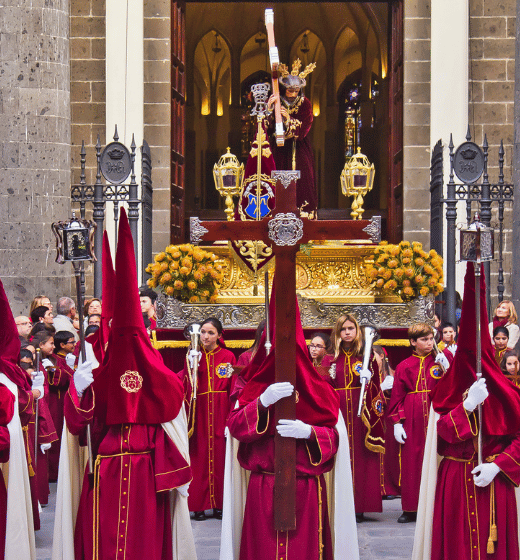

If you are studying Spanish, you must also understand the cultural aspect that the language brings with it.
This not only includes gastronomy and historical facts but also includes traditions celebrated on specific dates and its celebration is carried out with rituals that have become a custom within Hispanic societies.
Many of these dates have a sacred origin, as Hispanic culture has a deep religious imprint in its history.
One of the most important dates within these traditions is Holy Week.
Have you heard of this celebration?
Whether you know about it or not, you must have the right information to better understand the origin of this celebration and its importance within the culture.
Join us as we take a look back at Semana Santa. Spanish Express brings you all the information you need to know!
What is Semana Santa or Holy Week?
If we talk about important dates in Christian culture, Holy Week undoubtedly ranks first.
This religious celebration is also known as Easter Week in some countries and commemorates each stage of the Passion of Jesus Christ.
The festival opens with Jesus’ entry into Jerusalem, then his Stations of the Cross, and then culminates the week in the name of his death and resurrection.
In short, all these stations represent the last week of Jesus Christ on earth, making up Holy Week, a recounting of his glory and his tragedy.
When is Holy Week celebrated?
The date of this celebration can vary depending on the year.
In general, Holy Week takes place between March and April. Just after Palm Sunday and from Ash Wednesday onwards all the remaining days are considered holy.
However, it is the Easter Triduum that is considered the most important and sacred part, lasting from Maundy Thursday until Easter Sunday, also known as Easter Sunday.
In the beginning, Easter used to coincide with the Jewish Passover, and the celebrations were very similar. It was first celebrated by the Jews and then, around the 4th century, Christianised Romans began to adopt the celebration.
Later, with the spread of Christianity to areas of Europe, Africa, the Americas and the Middle East, the original Easter rites began to change, and traditions considered pagan, such as celebrating spring, were adopted.
Due to these variations, Easter has evolved from changing dates to certain traditions in the various Christian territories that celebrate it today.
The one thing that many of these countries have in common is that, for the most part, they take these days as holidays, ceasing all work and other activities.
As we mentioned earlier, Holy Week is a recounting of every situation in which Jesus Christ was exposed during those days. But, each of these days holds an important event:
Palm Sunday
On this day, Jesus Christ made a triumphant entry into Jerusalem, greeted by crowds waving palm branches.
This moment, symbolizing peace and victory, marks the start of Holy Week, a period of profound religious significance.
As Jesus rode a donkey into the city, fulfilling an ancient prophecy, his followers laid palm leaves before him, a gesture of honor and respect.
This event not only signifies Jesus’ acceptance as the messianic king but also sets the stage for the events that follow.
Holy Monday
Jesus’s actions on this day underscore his critique of the religious establishment and his deep compassion for humanity.
By driving the merchants from the Temple in Jerusalem, Jesus condemned the commercialization of religious practices, emphasizing the Temple’s sanctity.
His anointing at Lazarus’s home in Bethany further highlights his acceptance of his forthcoming death and preparation for burial, demonstrating humility and the breaking of social norms to honor him.
Holy Tuesday
On this day, Jesus’s teachings focused on preparedness, loyalty, and vigilance.
He foretold Judas’s betrayal and Peter’s denial, challenging his disciples and followers to reflect on faithfulness in times of crisis.
These predictions underscore the human struggles with fidelity and fear, inviting believers to contemplate their own steadfastness in their faith journey.
Holy Wednesday
Also known as Spy Wednesday, this day is marked by the dark agreement between Judas Iscariot and the Sanhedrin.
For thirty pieces of silver, Judas agreed to betray Jesus, setting in motion the events leading to Jesus’s crucifixion.
This act of betrayal emphasizes themes of greed and treachery, reflecting on the vulnerability of trust and the profound consequences of betrayal.
Holy Thursday
Maundy Thursday commemorates Jesus’s Last Supper with his disciples, the institution of the Eucharist, and the washing of the disciples’ feet.
This day highlights Jesus’s teachings on service, humility, and community.
Following the supper, Jesus’s prayer in the Garden of Gethsemane reveals his human apprehension and divine submission, culminating in his arrest, which signifies the ultimate sacrifice for humanity.
Holy Friday
This solemn day marks the culmination of Jesus’s Passion, with his trial, crucifixion, death, and burial.
From the interrogation by Pilate and Caiaphas to the painful journey to Golgotha and his eventual death on the cross, this day reflects on suffering, sacrifice, and redemption.
Jesus’s path, marked by physical and spiritual agony, underscores the depth of his love and commitment to humanity’s salvation.
Holy Saturday
Known as Easter Eve, this day symbolizes the quiet mourning of Jesus’s death and the anticipation of his resurrection. It’s a time of reflection on loss, waiting, and hope.
The Solitude of Mary, contemplating the Virgin Mary’s sorrow, adds a deeply human aspect to the divine narrative, connecting believers to the emotional reality of Jesus’s death.
Easter Sunday
Celebrating Jesus Christ’s resurrection, this day stands as the cornerstone of the Christian faith. The joy of Easter reflects the triumph of life over death, offering believers hope and renewal.
Christ’s resurrection signifies the ultimate victory over sin and death, affirming the promise of eternal life for those who follow him.
This miraculous event not only confirms Jesus’s divinity but also offers a message of love, redemption, and new beginnings to the world.
How is Holy Week celebrated in Spain?
In Spain, Holy Week is a time filled with deep traditions and religious ceremonies. This week brings to life the story of Jesus’s life and his sacrifices.
Ocaña’s Silence
Starting in Ocaña, a town known for its vibrant Holy Week celebrations, the atmosphere is solemn yet full of anticipation.
On Palm Sunday, the air fills with silence as ten religious brotherhoods take to the streets. Led by the local gypsy community, they carry olive branches and wooden crosses, embodying the spirit of the week.
These processions, especially significant on Holy Thursday and Good Friday, showcase the dedication of the people to these traditions.
Good Friday Tradition
Good Friday stands out as the day when the Brotherhood of the Armed Ones, in their eye-catching outfits, walk through the town.
They walk barefoot, chains dragging along, in a powerful display of faith and penance.
At night, the streets of Ocaña transform into a stage for these elaborate processions, lit by candles carried by the faithful.
Málaga’s Mercy
Málaga offers a different yet equally touching tradition.
Here, a prisoner is given the chance for a new start in a ceremony where they receive a blessing from the figure of Jesus.
It’s a moment that speaks to the heart of forgiveness and renewal.
León’s Processions
In León, the Holy Week processions bring together the Sorrowful Mother, Saint John, and the Nazarene in the Plaza Mayor.
This meeting, followed by the procession of the Pasos, draws people from all over, blending locals and visitors in a shared experience of reflection and reverence.
Easter in Barcelona
Barcelona during Easter, from March 29 to April 1, 2024, balances solemn Holy Week traditions with a lively spring atmosphere. The city buzzes with activity.
While traditional ceremonies and masses draw the devout, the streets are also filled with people enjoying the break, and chocolate shops showcase tempting Easter treats.
Be aware, that on Good Friday and Easter Monday, many places close. Yet, the Barcelona Cathedral becomes a focal point for Easter events, especially on Good Friday.
Expect processions and activities there from the afternoon into the evening. Although it’s a holiday period, Barcelona’s energy and the promise of spring make it a special time to visit.
Whether seeking spiritual moments or enjoying the festive vibe, Easter in Barcelona offers something unique for everyone.
Easter in Burgos
In Burgos, Easter Week, or “Semana Santa,” transports you back to medieval Castile. Starting from the 13th century, this deeply moving festival has commemorated Jesus Christ’s death with solemnity and reverence.
The city’s 16 religious brotherhoods, many tracing their origins to the Middle Ages and associated trade guilds like silversmiths and gardeners, play a pivotal role in the celebrations.
The festival ignites on the Friday of Sorrows with a torch-lit penitential rosary, setting the tone for the days to come. Passion Saturday brings the Announcement and Proclamation of Easter Week, leading to Palm Sunday’s “borriquita” procession, an homage to Jesus’s entry into Jerusalem.
Highlights include the Stations of the Cross on Holy Monday, starting from San Esteban Church and winding up the castle hillside, and the deeply moving “Encuentro” and “Santo Entierro” processions on Maundy Thursday and Good Friday, respectively. Easter Saturday’s Our Lady of Solitude Procession preludes Easter Sunday’s vibrant “saint’s dance” during the Easter Proclamation Procession.
Burgos’s Easter Week offers a unique opportunity to witness the majestic “pasos” or religious floats, adorned with statues by renowned religious artists, parading through the city’s historic streets. This festival is not just a religious observance but a living testament to the city’s rich cultural heritage and enduring traditions.
Easter in Cádiz
Easter in Cadiz, Andalusia, turns the city into a vibrant scene of tradition and community spirit. This celebration, rooted in the 16th century, brings to life the story of Christ through street processions that capture the imagination and hearts of everyone watching.
The most captivating moments unfold in the evening, climaxing with the grand procession at 11 pm on Good Friday, drawing the community together in a shared experience of faith and tradition.
A unique aspect of Cadiz’s Easter is the saeta, an intense flamenco song sung from balconies, expressing deep emotions. While once spontaneous, these performances are now planned, yet they deeply move both singers and listeners, pausing the processions with their powerful delivery.
On Easter Sunday, the mood shifts from mourning to joy, as hats signifying mourning are removed to celebrate Jesus’ resurrection, symbolizing hope and renewal.
Cadiz during Easter is more than a festival; it’s a time when the city’s rich history, culture, and vibrant spirit are on full display, offering a deeply moving experience for both locals and visitors alike.
Easter in Girona
Easter in Girona is a beautiful blend of natural beauty and deep-rooted traditions, making it an unforgettable spring getaway. The Costa Brava and the Girona Pyrenees come alive with cultural visits, nature walks, and exceptional gastronomy.
The celebration starts with Palm Sunday, featuring processions with palms and olive branches, signifying the beginning of Holy Week. Unique to Girona are the ‘Manaies’ procession and the medieval Dance of Death in Verges, both deeply moving representations of historical traditions.
The culinary landscape also transforms, with cod dishes, ‘bunyols’, and the traditional Easter ‘Mona’ cake, enriching the experience. Girona’s Easter is a perfect time to immerse oneself in the harmonious blend of solemnity, community, and natural splendor.
Easter in Gran Canaria
Easter on Gran Canaria is a vibrant celebration, distinct for its enduring traditions dating back to 1478. The island, known for its favorable weather, becomes a focal point for tourists and locals alike during Holy Week, blending solemn religious processions with the island’s inviting climate.
Each town on Gran Canaria offers its own unique Easter observance, but Las Palmas stands out for its historical and artistic processions. Celebrated sculptor José Luján Pérez’s works, pivotal in the Canary Islands Baroque sculpture, are paraded through the streets, embodying the island’s rich cultural heritage.
The Holy Week commences with Palm Sunday’s procession, symbolizing Jesus’s entrance into Jerusalem, and continues with various key events, including the silent Via Crucis and the ornate Procession of the Mantillas, reflecting Canarian cultural pride.
Unlike other locales where Easter might be marred by unpredictable weather, Gran Canaria guarantees mild temperatures and sunshine, perfect for the outdoor activities that define this sacred week.
This period not only offers a deep dive into the island’s spiritual life but also welcomes visitors to partake in its natural beauty and warm hospitality, making it a unique blend of devotion and celebration.
Easter in Madrid
During Easter, Madrid beautifully showcases its rich tapestry of faith through solemn processions and sacred music, embodying the spirit of Semana Santa.
This week is a profound observance of Christ’s life, with the city’s churches hosting special liturgies that attract both the faithful and visitors.
The air fills with the scent of olive branches as the faithful carry candles, creating an atmosphere of reverence and tradition.
One can experience the historic center of Madrid in a unique light, walking through its ancient streets lined with marching bands and echoes of saetas, a haunting reminder of the city’s deep religious roots.
The Virgin Mary and other pasos, some dating back to the 17th century, are paraded with overwhelming fervor, reflecting the collective devotion of the community.
Easter treats, embodying centuries of culinary tradition, are eagerly consumed, from the crispy yet soft torrijas to savory Soldaditos de Pavía, showcasing the role of food in Madrid’s Easter celebrations.
Amidst these observances, Madrid remains a bustling world capital, yet during Holy Week, it offers a serene escape into a country steeped in religious tradition and history, marking the holiest days on the Christian calendar.
Easter in Mallorca
Easter in Mallorca presents an enchanting blend of sacred traditions and the island’s natural beauty, making it a prime destination for those seeking to immerse themselves in the observance of Holy Week in Spain.
From the revered processions that weave through the towns and villages to the serene mornings where the faithful gather, Mallorca encapsulates a unique Easter experience.
The island’s climate, offering mild temperatures and abundant sunshine, serves as the perfect backdrop for the week’s events, from Palm Sunday to the solemnity of Black Saturday, culminating in the joyous celebrations of Easter Sunday.
Mallorca’s Easter is characterized by its vibrant parades, where brotherhoods carry pasos adorned with figures of Christ and the Virgin Mary, an enduring testament to the island’s rich Catholic heritage. These processions, underscored by the rhythmic beat of drums and the poignant saetas, draw both the devout and the curious, creating a profound communal atmosphere.
Beyond the spiritual, Mallorca during Easter is a time for exploration and enjoyment. From trekking along scenic routes that offer breathtaking views to savoring traditional Easter delicacies that reflect the island’s culinary diversity, the experience is holistic.
Families and visitors can also indulge in a variety of activities, from horse riding on the serene beaches to discovering the hidden gems of Mallorca’s “Casas Santas,” each moment is an invitation to delve deeper into the island’s culture and traditions, marking every day of Holy Week as an opportunity to engage with the world in a more meaningful way.
Easter in Murcia
Easter in Murcia is a vibrant blend of history, art, and community, recognized internationally for its unique celebrations dating back to the 15th century. The “Coloraos” brotherhood, one of the oldest, starts the week with a procession distributing candies and traditional foods, symbolizing Murcia’s generous spirit.
The highlight is Good Friday’s procession featuring Francisco Salzillo’s sculptures, where thousands, some barefoot, march in purple, sharing treats with onlookers.
Murcia’s processions stand out with neo-Baroque floats carried in a unique style, creating an unforgettable atmosphere. This week is more than processions; it’s about community, art, and sharing, making Easter in Murcia a deeply engaging experience.
Easter in Sevilla
Easter in Sevilla transforms the city into a vibrant tapestry of tradition, faith, and community. For seven days, from Palm Sunday to Easter Sunday, Seville bursts into life as brotherhoods parade through the streets with a blend of austerity and passion.
The city’s iconic Cathedral and Giralda Tower, central to Easter observances, recommend securing skip-the-line tickets for a hassle-free visit.
Seville’s Easter, or Semana Santa, stands out for its authenticity and fervor, making it a unique celebration globally. Observers and participants alike are immersed in a deeply cultural experience, following age-old customs and engaging in the solemn beauty of the processions.
Each procession, daily from dusk till dawn, captivates with its decorated floats, or pasos, bearing statues of Jesus Christ and the Virgin Mary, accompanied by the solemn beat of drums and the poignant saeta songs.
For those seeking to experience Easter in Seville, preparation is key. Arriving and departing in the morning can help avoid the procession-induced delays. Visitors are advised to plan extra travel time, respect the solemnity of the occasion, and navigate the crowds with patience.
Despite the challenges, Easter in Seville offers an unparalleled opportunity to witness a living tradition that beautifully marries art, history, and spirituality in the heart of Andalusia.
Easter in Valencia
Easter in Valencia offers a diverse array of activities that cater to everyone’s interests, making it a vibrant city to explore during this festive season.
From attending the unique Semana Santa Marinera processions that take place on the beaches of the coastal neighborhoods to exploring Europe’s largest aquarium, the Oceanogràfic, there’s no shortage of things to do.
The city’s Semana Santa Marinera, distinct from the rest of Spain, features processions known for their silence and moderation, creating a solemn atmosphere that contrasts with the lively parades on Easter Sunday.
Families can delight in the vast marine ecosystems represented at the Oceanogràfic, while those interested in religious and cultural traditions shouldn’t miss the Encounter of Christ with his Mother on Easter Sunday, a unique Valencian tradition.
A visit to the Valencia Cathedral offers insights into the city’s rich history and architectural beauty. For those looking to dive deeper into Valencia’s heritage, a tour of its historical treasures, including UNESCO World Heritage sites, is a must.
The Albufera Natural Park provides a scenic backdrop for a traditional Valencian paella, offering a blend of natural beauty and culinary exploration. Sampling the Valencian Easter Mona, a unique local dessert, adds a sweet touch to the Easter experience.
For those looking for nightlife, Valencia’s vibrant bars and clubs offer a variety of entertainment options. With its extensive coastline, spending a relaxing day at the beach is also a popular choice during Easter.
Lastly, exploring Valencia’s museums and cultural exhibitions provides a comprehensive understanding of the city’s rich artistic and religious heritage, making Easter in Valencia an unforgettable experience.
Do you want to learn more about Hispanic holidays?
Spanish Express not only guides you on your way to learning Spanish but is also committed to showing you the best of Spanish culture through our Spanish Homestay Immersion Programme (SHIP).
With this programme, you will get to know 10 cities in Spain, including cosmopolitan Barcelona and cosy Valencia, while you learn Spanish.
You choose the destination, and we’ll do the rest!
Dare to live a new adventure and be dazzled by all of Spain’s world-renowned traditions and festivities.
Join us and live a once-in-a-lifetime experience… We are waiting for you!













